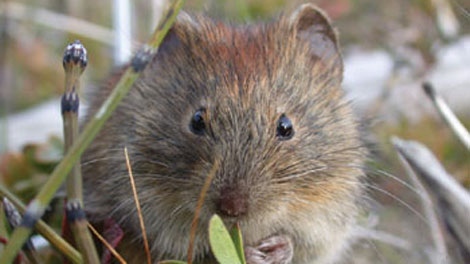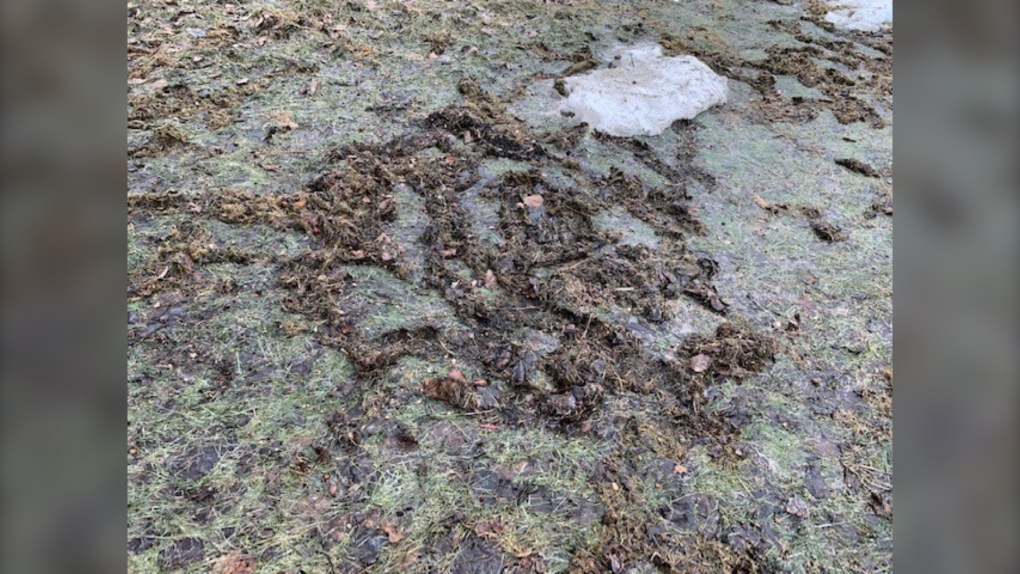'It's unsightly': Snowmelt exposes havoc wreaked by ravenous rodents on Winnipeggers' lawns
With the snow melted away, it’s exposing some less-than-picturesque lawns that have become a smorgasbord for a certain type of rodent.
When Arya Raichura walked into her backyard this spring she was greeted with an unwelcome surprise.
"I think it is a large infestation," said Raichura.
She said she has lived at her home in south Winnipeg for 16 years and has never had to deal with anything like this.
"It's frustrating and I've read it is rampant right now, there is a boom population of voles. So I don't feel that I'm special that way. But I know I have a lot of debris around my yard that probably didn't help."
Entomologist Taz Stuart says he’s already started getting calls for vole control.
A relative of hamsters and lemmings, voles are small, stocky rodents that look like field mice on steroids.
Stuart expects this to be an above-average year in requests to halt the pesky rodents from feasting on scrumptious sod and shrubs.
 A vole is seen in this undated photo.
A vole is seen in this undated photo.
“We had a reasonable amount of snow this year and, of course, the natural predators weren’t controlling them. Voles love eating the bottoms of your grass, bottoms of plants, flowers, even some small shrubs and trees. They’ll feed on them over the winter,” he said.
Now, the rodents’ ravenous rampages on Winnipeggers’ lawns are being exposed by the melting snow.
“You’re seeing all those little trails where they’ve been feeding all winter, and it’s unsightly.”
He said the rodents can be controlled with baits and snap traps along the perpendicular of where the trails and holes were made and the voles were overwintering.
 (Source: Gary Robson/CTV News Winnipeg)
(Source: Gary Robson/CTV News Winnipeg)
“Bringing in a professional to set up those traps is a very, very important key to removing those problems,” Stuart said, noting certain traps can pose a hazard to household pets.
In his experience, Stuart says lawns decimated by even the hungriest of voles can recover with some soil, seed or even raking.
However, if you don’t address the issue this year, the entomologist said they could come back hungry for more.
“If you don’t control them, they will potentially be bad next year, as well. They will still be there in the summer, just your grass will be growing and you’re not going to see the damage,” he said.
CTVNews.ca Top Stories

WATCH LIVE Canadian government to make border security announcement today: sources
The federal government is set to make an announcement on new border security measures after question period today.
Fall sitting bookended by Liberal byelection losses ends with Trudeau government in tumult
The House of Commons adjourned on Tuesday, bringing an end to an unstable fall sitting that has been bookended by Liberal byelection losses. The conclusion of the fall sitting comes as Prime Minister Justin Trudeau's minority government is in turmoil.
Prosecutors charge suspect with killing UnitedHealthcare CEO as an act of terrorism
The man accused of killing UnitedHealthcare's CEO has been charged with murder as an act of terrorism, prosecutors said Tuesday as they worked to bring him to a New York court from from a Pennsylvania jail.
W5 Investigates How a convicted con artist may have exploited Airbnb's ID checks in rental scams
In part two of a W5 investigation into landlord scams, correspondent Jon Woodward looks at how hosts on Airbnb may be kept in the dark about their guests' true identities – a situation that a prolific Canadian con artist appears to have taken advantage of.
Alcohol is not good for us. 5 tips to stay safe(r) if you drink
The holidays and New Year’s Eve are fast approaching, and for many, that means alcohol-infused festivities and gatherings to navigate.
The world's busiest flight routes for 2024 revealed
If you think planes have got fuller and the skies busier over the past year, you’d be right — especially if you live in either Hong Kong or Taipei.
Sex-ed group deemed 'inappropriate' by Tory government returns to N.B. schools
A sexual-education group whose presentations were deemed "clearly inappropriate" by the previous New Brunswick Progressive Conservative government has been cleared to return to the province's schools.
Suspect in Gilgo Beach serial killings is charged in the death of a seventh woman
The New York architect facing murder charges in a string of deaths known as the Gilgo Beach killings was charged on Tuesday in the death of a seventh woman.
Number of family doctors in Canada now growing at a slower pace: report
Canada is facing a growing crisis in its health-care system as the rate at which family doctors are growing has slowed, according to a recent report.


































